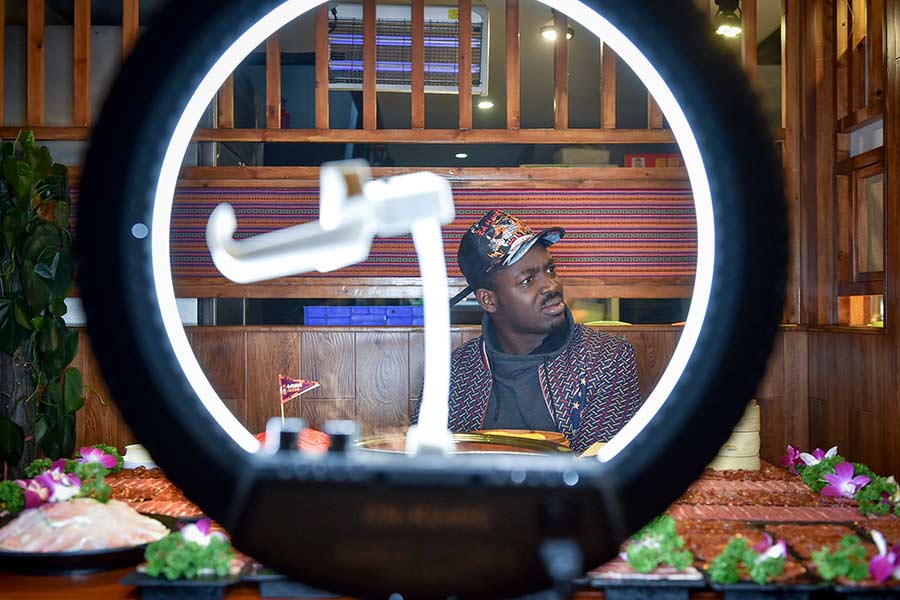Advertisers, consumers embrace social media


For Li Jiaqi, 27, it took less than a year to increase his bank balance to over 10 million yuan ($1.49 million) from a relatively small amount without having to rob a bank, win a lottery, find a secret treasure or land an inheritance.
His route to riches is lipstick sales online using live streams of video-sharing platforms such as Douyin.
In a recent two-hour livestreaming session, he sold 15,000 lipsticks within 5 minutes, beating billionaire Jack Ma who wanted to compete with him.
He is increasingly mentioned as an icon for lipstick try-on pitches. A social media influencer, he is not satisfied with the achievement.
Li is now the holder of a Guinness World Record for applying lipstick on most models in 30 seconds.
The video of Li's Guinness World Record challenge adorns Li's Douyin page, with over one million thumb-ups already from his over 18 million fans.
"Every time Li endorsed certain lipsticks that were new to the market, I wanted to buy them," said Huang Xinyi, 29, a film production assistant, in Beijing. "He appears more trustworthy to me, like a friend or classmate. He makes his videos really different from endorsements featuring other celebrities," she said.
Social media influencers like Li are certainly a top choice when makeup brands formulate their marketing strategies and brand endorsements.
With social media platforms increasingly becoming major information-sharing hubs for Chinese users, endorsements by KOLs (or key opinion leaders) are proving to be one of the most popular marketing tricks of advertisers in China.
According to a recent report from marketing data technology company AdMaster, about 81 percent out of about 110 advertisers interviewed said they are willing to increase their budget for social media advertising, and KOL endorsements were their top choice when choosing advertising media.
Overall, about 60 percent said they consider KOL endorsements as an essential part of their marketing strategies, according to the report.
Data from AdMaster showed that the number of cosmetics companies that have paid for KOLs in promoting their products surged by 81 percent year-on-year in 2018. The number is even higher for food companies at 92 percent.
"Social media advertising is entering a golden period, especially for e-commerce, as good content released by KOLs on such platforms may convince consumers into buying certain products, even though some of them are really not in need," said Neil Wang, president of consulting firm Frost& Sullivan China.
Such a trend has generated a billion-dollar business, according to Wang. He classifies the business into three main segments: suppliers from the upper industrial chain; social media platforms that act like a bridge connecting suppliers and consumers; and consumers.
"Information shared on social media platforms like Weibo appears to be more authentic to consumers, compared with that of other advertising forms," Wang said.
"Consumers feel they get useful information on certain products and tend to use interactive online posters."
However, the truth is, marketing gimmicks on social media platforms could well be undisclosed or in-disguise paid advertising.
About 40 percent of Chinese consumers have been influenced by KOLs in making purchasing decisions, according to AdMaster's report.
Data from Parklu, a KOL management platform in China, also showed about 1.5 percent of consumers would make a purchase immediately after KOLs post about products on Weibo, one of China's most popular social media platforms.
"The thing about Weibo is that it has weaker relationship with users, compared with WeChat (as sharing of information is restricted to friends and acquaintances), but it has a much stronger influence over consumers' choices when they see messages about certain products on Weibo," Wang said.
The last year has also seen an information boom on sharing platforms like Xiaohongshu. The app is quite similar to Yelp, but instead of people commenting on stores and shops, they share reviews on brands and products.
Xiaohongshu has grown to be one of the most-quoted Chinese apps. The number of times it was mentioned in reviews or articles surged 719 percent from the beginning of 2018 to the year-end, according to the AdMaster report.
Xiaohongshu is targeted more at female consumers. CHAO, a similar version of product information-sharing platform but for male users, was recently released by Q&A website Zhihu.
More specialized social media platforms will appear amid demand from both advertisers and consumers, the report pointed out.




































